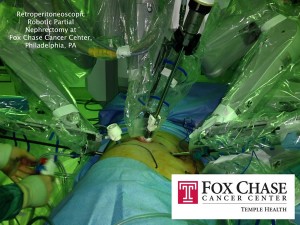
“Retro” Surgery is the Wave of the Future for Select Patients with Kidney and Adrenal Tumors
-
Minimally invasive surgery now offers many patients decreased blood loss, smaller incisions and quicker recovery.

Advantages of laparoscopic and robotic surgery especially benefit patients undergoing surgery on the kidney, ureter or adrenal gland, since traditional open surgical techniques demand relatively painful large incisions to safely gain access to these organs. However, some patients have had significant previous abdominal surgery and traditional laparoscopic/robotic surgical approaches may be too risky due to existing internal scar tissue. Moreover, patients with tumors on the back (or posterior) side of the kidney may need to have the entire kidney rotated in order for the surgeon to reach the tumor through traditional minimally invasive techniques.
In these specific cases, retroperitoneoscopic or retroperitoneal laparoscopic/robotic surgical approach makes minimally invasive surgery possible. The surgeon enters the body from the side and approaches the kidney or adrenal gland from behind the bowel sac, avoiding scar tissue or making aggressive rotation of the kidney unnecessary. This technique is technically demanding and requires experience; however, the approach allows many patients, who otherwise would not be candidates for minimally-invasive surgery, to avoid a large incision and leave the hospital in just a few days.
The urologic oncology team at the Fox Chase Cancer Center is one of the few teams on the East Coast that employs this advanced surgical technique for retroperitoneal robotic partial nephrectomy, retroperitoneal laparoscopic radical nephrectomy and retroperitoneal laparoscopic adrenalectomy.
